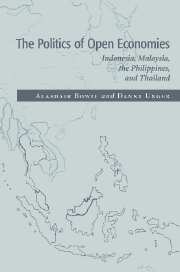7 - Conclusion
Published online by Cambridge University Press: 10 November 2009
Summary
We have traced the policy responses of four Southeast Asian developing countries to four different sets of external events, allowing us, therefore, to examine sixteen cases of policy response. The four countries had diverse economic and political conditions at the time they faced the first of these external events. Moreover, the external impacts did not affect the four countries in the same ways. In particular, higher oil prices affected the four economies in very different fashion. The combination of diverse initial conditions, common external influences, and different external effects provided us with comparative bases for assessing the intervening impact of our specified domestic economic, institutional, and political variables. In particular, we now are in a position to gauge the influence of those variables on economic openness.
Our independent variables explaining degrees of openness include ones relating to state resources and capacities, domestic institutional arrangements, political disjunctures, and political coalitions. We also looked at the impacts on openness of those institutions linking business interests to policymaking officials and of foreign development models. So as to isolate those domestic factors that most influence policymakers' responses to changing external economic constraints, we limited the number and range of independent variables from which we developed our hypotheses. Our choice of four broadly similar economies in a single region had a similar effect. It reduced the range of possible variables that might be responsible for divergent policy responses across the four economies we studied.
- Type
- Chapter
- Information
- The Politics of Open EconomiesIndonesia, Malaysia, the Philippines, and Thailand, pp. 157 - 192Publisher: Cambridge University PressPrint publication year: 1997

